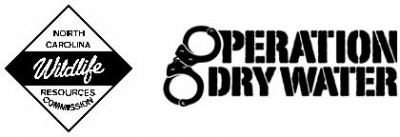
Wildlife officers with the N.C. Wildlife Resources Commission will be reaching out to as many people as possible this weekend about the hazards of boating while impaired as part of Operation Dry Water 2012.
The annual nationwide campaign will have law enforcement officers from local, state and federal agencies out in force June 22-24 to remind boaters that it is unsafe, as well as illegal, to operate a boat under the influence of drugs or alcohol. In North Carolina, penalties upon conviction include a maximum $1,000 fine and possible jail time.
Recreational boating fatalities last year jumped to their highest levels since 1998 and operating while impaired was the leading contributing factor, according to the U.S. Coast Guard’s report, 2011 Recreational Boating Statistics.
“We intend to reach out to as many people as possible about the hazards of boating while impaired,” said Sgt. Jeremy Harrill, a wildlife officer with the N.C. Wildlife Resources Commission based in Iredell County. “Boating is a safe and enjoyable pastime when people stay alert and follow the rules.
“We want boaters to understand the added risks and to avoid being impaired and boating. Our goal is to promote safe, responsible boating. Ultimately, it’s about saving lives.”
Operating a boat while impaired continues to be a major problem in the United States. Boat operators or even passengers with a blood alcohol concentration above the legal limit run a significantly increased risk of being involved in a fatal boating accident.
Operation Dry Water was launched in 2009 by the National Association of State Boating Law Administrators, a national nonprofit organization that works to develop public policy for recreational boating safety, in partnership with the U.S. Coast Guard to provide high profile law enforcement on waterways prior to the July 4th holiday. In North Carolina, Operation Dry Water is incorporated into the state’s “On the Road, On the Water, Don’t Drink and Drive” campaign.
Wildlife officers with the N.C. Wildlife Resources Commission are charged with enforcing the boating laws and regulations on public waterways. They can routinely stop vessels for safety checks or violations. The goal of this enforcement is always safety. For more information on recreational boating in North Carolina, visit www.ncwildlife.org/boating.
Logo courtesy of the North Carolina Wildlife Resources Commission
 Your Privacy Choices
Your Privacy Choices